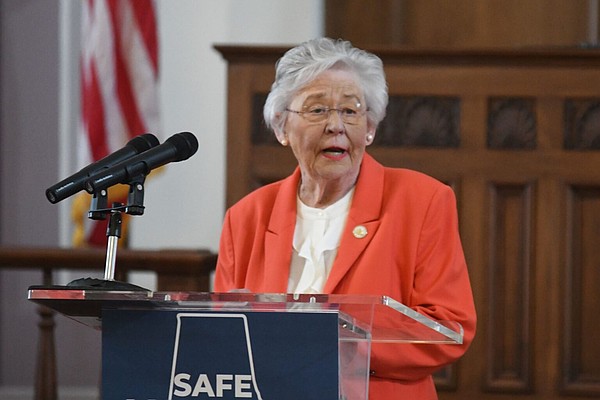Gov. Kay Ivey on Wednesday signed a bill aimed at regulating consumable hemp products into law.
House Bill 445, sponsored by Rep. Andy Whitt, R-Harvest, faced strong opposition from the hemp industry, which claims the bill overregulates federally legal products, and the Alabama Policy Institute, a conservative think tank, which argued it did not regulate the products enough.
Gina Maiola, a spokesperson for Ivey, confirmed that the governor had signed the bill in a text message on Wednesday, but did not provide further comment.
Whitt said after the governor’s signature that it was “an easy bill” for him to sponsor but “a hard bill to pass.”
“It was hard because I took shots from both sides,” he said, saying that it was difficult to listen to the “stretches of truth,” such as claims from the Alabama Policy Institute that it would legalize recreational marijuana or from the industry that it’s a “complete ban.”
“It is putting guardrails on an unregulated and unlicensed product in the state of Alabama that’s preying on our youth,” Whitt said.
Messages seeking comment were left with the institute and Molly Cole, a lobbyist for the Alabama Hemp and Vape Association, who indicated that litigation was being considered.
The legislation will require testing and labeling for all consumable hemp products and caps at 10 milligrams per individually wrapped product and 40 milligrams per package. It will require the Alcoholic Beverage Control Board to license retailers of these products, restrict retail establishments selling hemp products and impose an excise tax on consumable hemp products.
The bill also prohibits sales to minors. It bans smokable hemp products and imposes restrictions on online sales and direct delivery.
Whitt maintained that his efforts are aimed at reducing youth access to these products, saying that the industry has operated largely unchecked.
Representatives of the hemp industry said the bill’s language was vague and have suggested that litigation will follow.
Lawmakers, business owners, patients and lobbyists have also expressed uncertainty about the legislation. Whitt said that the bill also bans hemp-derived vapor products, but that is not clearly defined in the bill.
It’s not clear if the bill would ban CBD, a non-psychoactive cannabinoid found in hemp. The bill explicitly bans smokable hemp products and certain psychoactive cannabinoids but defines “consumable hemp product” broadly as any finished product intended for human or animal consumption that contains any part of the hemp plant or its derivatives.
According to the bill, “any smokeable hemp product” not limited to “plant product or raw hemp material that is marketed to consumers as hemp cigarettes, hemp cigars, hemp joints, hemp buds, hemp flowers, hemp leaves, ground hemp flowers or any variation of these terms to include any product that contains a cannabinoid, whether psychoactive or not.”
Whitt said that the legislation provides an opportunity for hemp business leaders to “pivot into the products that are approved here in Alabama that can truly help Alabama citizens again.”
Read more at AlabamaReflector.com.
Gov. Kay Ivey on Wednesday signed a bill aimed at regulating consumable hemp products into law. Read More


